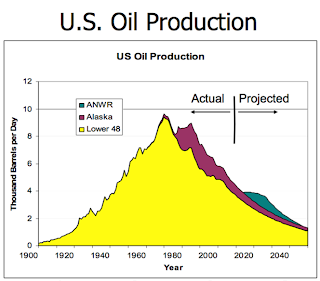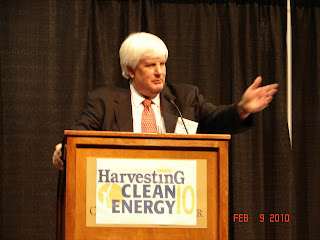Next up was US Representative Doc Hastings (R-WA) and the contrast of his "special remarks" to those yesterday by US Representative Jay Inslee (D-WA) was stark. Inslee supported the Waxman-Markey and Stimulus bills; Hastings opposed them. Inslee is one Congress' most impassioned and articulate champions of renewable energy and clean technology; Hastings said he is "in favor" of renewables, but spent most of his time advocating for the primacy of oil and gas.
Said Hastings, "we cannot ignore the worldwide supply" or oil and coal, which he implied would last almost indefinitely: "Someday, probably not in my lifetime, we'll move away from oil and gas." He shared the conference consensus view that policy needs to address our growing energy insecurity: "It is not in our best interest to be importing from parts of the world that are hostile to us." We should not be importing oil when we have "tremendous reserves" in Alaska and on the Outer Continental Shelf (OCS) and "we ought to be utilizing that." Hastings asserted that every time we look for oil "we find more" and that "we are getting better at that every year."
Sadly, no.
US oil reserves have been shrinking for decades. So has production. Offshore oil drilling simply will not make much difference. I am always disappointed when one of our more senior elected officials spouts easily disproved untruths in service of a pet ideological position.
Hastings objects to Waxman-Markey or any other form of cap and trade, a remark that led to some scattered applause. He believes that it ends up picking winners and losers, especially around who gets credits and who has to compete in auctioned allowances. This picking of winners and losers must be avoided, as it is a "subjective choice" and (deeply horrifying) a "non-market way."
He then, strangely contrasted that with the supposed success of a lighter governmental touch: the reduction of smog in Los Angeles, declaring that "people got fed up with it and industry responded." He leaves out the decades of relentless public pressure and governmental intervention and regulation, over the vociferous objections of industry, the Chamber of Commerce and businesses generally. The industry responded all right, by fighting tooth and claw. It was decades to win the relative success of today.
Hastings is absolutely right that governments should not pick winners and losers, and that is exactly why we need some kind of price on carbon, whether through cap-and-trade, a tax, or some other mechanism. Right now, the ability of dirty legacy energy interests to pollute the commons creates an un-level playing field. Opposing EPA regulation of carbon is also tantamount to choosing sides in the marketplace of energy. If Hastings were to truly adhere to his stated principles of diversifying energy, and being a true all-of-the-above advocate, he would support regulation of greenhouse gases, and demand that neither government nor the public health unjustly subsidize certain forms of energy. That he can point to a diverse list of renewable energy projects in his district shows not that this can happen without needed energy neutrality, but in spite of the lack of it.
Partisanship was another "special remark" as Hastings noted that he was "a big proponent of nuclear power... It is very clean." He added that "I was very pleased when [President Obama] talked about that in the State of the Union address." However, he then decried "the mixed message" when Obama "then talked about shutting Yucca Mountain." Yet, Obama did not mention Yucca Mountain in the SOTU, nor mention nuclear waste at all. Like the Teabaggers yesterday, Hastings cannot bring himself to agree or be agreeable even when his opponent grants him his point.
Hastings did not take questions.
Richard Wynne, Director of Geopolitical and Policy Analysis at Boeing Commercial Airplanes gave an engaging and informative presentation on the aviation company's efforts to reduce its emissions, primarily by developing viable alternative fuels to Jet A. He did so with poise and good humor, even in the face of a myriad of technical problems with the slide deck.
Air transport accounts for 8% of GDP and 32M jobs globally. Jet fuel is about 25% of an airline's operating costs; every 1 cent increase in the cost of a gallon of fuel adds $195M in costs. The industry is responsible for 2-3% of total CO2 emissions. Boeing wants to reduce this 25% by 2020.
"The industry uses 21st Century airplanes in a 1960's or 1970's infrastructure." The air traffic system is about 12% inefficient from such things as routing, flight paths, descent methods, etc.
Boeing uses carbon fuels now and does not believe that carbon capture and sequestration (CCS) or gas-to-liquids (GTL) techniques are worthwhile--the life cycle analysis (LCA) is poor. First generation fuels (e.g. ethanol) have food-for-fuel and other issues. Boeing is focused on 2nd generation fuels such as those made from camelina and jatropha, which may be as little as 2-3 years away from regular use (in a blend with regular Jet A.) Algae is still 8-10 year out, or maybe "decades." Camelina "has a lot of potential" but it won't be enough on its own; a multiple track approach is needed.
Boeing is also engaged in long term research on hydrogen and fuel cells. Batteries are unlikely to ever have the energy density to power full-size commercial jets.
The Three Rivers Convention center has had a really surprising number of problems with its audio/visual systems and setup during the conference. Clickers that don't work, screens poorly positioned, screens going out, no cheat screens for the presenters, choppy video, no one able to load or then advance slide decks, ... You would think that a convention center, whose raison d'etre is to host exactly these things, would execute them flawlessly, or at least with many fewer glitches. That said, the staff has been courteous and helpful. Just a lot of technical problems.
Burt didn't escape Washington, DC in time, so I gave his presentation this afternoon. A good audience, and very interesting presentations by fellow panelists Keith Knitter of Grant County PUD and Steve Rigdon of Yakama Power. Thanks to Andrew Munro of Grant County PUD and President of the National Hydropower Association for moderating and making the panel a success.
During the Plenary Panel Claudio Stockle of Washington State University urged that we plan for the middle-of-the-road climate change scenario. We can't know what will be, he said, but it is "prudent to start taking some action, not to ignore it." He used the amusing analogy: if we knew crossing a busy road with our eyes shut resulted in only a 10% chance of being hit, would we still do it? "I wouldn't cross!" he said. With climate change, even if the data is unclear, we should act. If we get the worst-case scenario, "we are in big trouble."
Read Smith, National o-Chair of 25x25 remarked "putting your head in the sand is not a plan. That's not leadership." Elected officials need our help.
Ross MacFarlane of Climate Solutions gave an excellent presentation during the breakout session on Energy Legislation in DC. I especially liked one of his slides illustrated with a Joel Pett cartoon. Ross also made the point that an emissions cap reduces pollution and creates incentives without picking winners. Exactly. Someone tell Doc.
Climate impacts and energy supply are the dominant drivers of 21st Century security concerns, but "if you are thinking about this as an environmental issue first and foremost, you're missing the point." --Frank Gaffney
Ross noted in response to a question that Senator Maria Cantwell's CLEAR Act had some merit, but that even the Senator knows that her bill will not pass as is as a standalone bill. But it can and probably will be part of a hybrid effort that will pass this year. Although pessimistic when heading to RETECH last week, Ross returned more hopeful that something will pass this year. But there is the "danger of the perfect being the enemy of the necessary." Indeed.
David Kolsrud gave a deadpan but hilarious presentation for the lunch keynote. Some of his better lines:
They have never built a statue in honor of a pessimist.
You can't tell how far a frog can jump by looking at him.
The energy and climate bill is the biggest rural development initiative since the Homestead Act.
We're all going to live in the future, and if we're going to live there, let's be a part of it.
China had its head in the sand. Then Nixon went there and we traded places. Now we have our head in the sand. What are we doing? Looking for more oil?
The exhibits have been very well attended and I have been repeatedly impressed and very pleased with the breadth of attendees, spanning all aspects and technologies of renewable energy and clean technology. The event has produced some robust synergy amongst different stakeholders and viewpoints. So far a great success.
It has also been a smashing success for Hydrovolts. I've done 2-3 dozen tradeshows and exhibitions over the years and this is the first time I have ever run out of brochures. And the first time I've run out of business cards. Awesome.
Burt will finally arrive at the conference about 9:30 Tuesday, and hopes to meet as many folks as possible. Look for him at our booth!












No comments:
Post a Comment